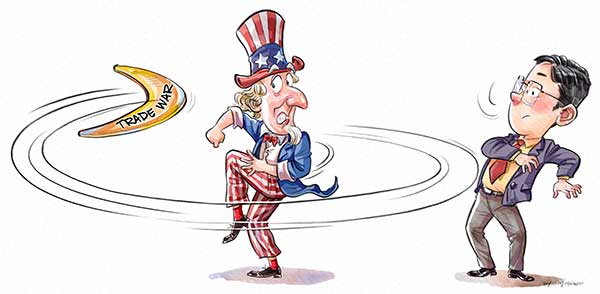It's time to give fitting reply to Trump


Editor's note: US President Donald Trump signed a memorandum on Thursday, purportedly in accordance with Section 301 of the US Trade Act of 1974, to levy huge tariffs on imports from China and restrict Chinese foreign direct investment in the United States. Three experts share their views with China Daily on the consequences of Trump's move and how China should respond to it. Excerpts follow:
US action seriously violates WTO rules
He Weiwen, a senior researcher at the Center for China and Globalization
It is obvious that neither Trump nor China would like to engage in a trade war. To a large extent, whether a trade war will be protracted depends on Trump. However, US industries that rely on exports to China and the response of Trump's vote bank are expected to put a brake on Trump's decisions.
The problem is, if the US midterm election result doesn't go his way, Trump might blame China for it and then fire more trade volleys on China. So China has to take decisive and vigorous measures to counter the Trump administration. And the more forceful the countermeasures are, the more effective they will be, and the tit-for-tat could yield positive outcomes, even cooperation, while concessions by China would only lead to further unilateral moves by the US.
In fact, China could work along both lines: resort to international organizations including the World Trade Organization to resolve the issue, and take practical actions on its own because appealing to the WTO can be time-consuming.
Speaking of the WTO, the US has seriously violated the world body's rules. The Section 301 investigation Trump ordered is outdated, as it was used by the US in the 1980s when the WTO had not been established. And when the European Union appealed to the WTO in the 1990s after the US launched a Section 301 investigation against it, the WTO nullified the investigation. More important, WTO members are prohibited from unilaterally changing their trade relations with other members without the world body's approval-and China and the US both are WTO members.
Trump's move will hasten the pace of innovation
Zhao Guodong, the secretary general of the Zhongguancun Big Data Industry Alliance and a researcher with Pangoal Institution
By restricting Chinese investment (and therefore mergers and acquisitions) in the US, Trump will make it even more difficult for Chinese companies to acquire technology and prohibit their US counterparts to tap into China's lucrative market. For instance, the win-win cooperation in the big data sector where the mergers and acquisitions of US small tech companies by Chinese enterprises offer technology to the latter and market access to the former will be put on hold.
However, the timely establishment of the State immigration administration will help China attract more tech talents and counterbalance the negative effects of Trump's move. Beijing has just introduced new measures to attract more overseas talents, including those from Silicon Valley. Besides, China's supply-side reform and the Belt and Road Initiative will help the country reduce its reliance on the US for trade and technology.
Actually, Trump's trump card in the trade war might prompt China to expedite the development of a more advanced and high-tech economy.
China can emerge from a Trump-instigated trade war as a winner if it hastens the pace of innovation in industries and technologies, and succeeds in attracting more talents from across the world with an open mind.
Global financial markets may not suffer severe setback
Xiong Peng, a senior researcher at Pangoal Institution
Trump's decision to impose tariffs of up to $60 billion on Chinese products and limit Chinese direct investment in the US raises several points.
First, the US' trade policy is based on geopolitics, rather than economics. The tariffs imposed on all steel and aluminum imports are only an attempt to ascertain China's reaction while the specific tariff policy's priority target is China.
Second, the team led by US Trade Representative Bob Lighthizer and US National Trade Council Director Peter Navarro has evaluated the possible damage the tariff policy could cause to the US. But it should also be presumed that both sides are adequately prepared for and intelligent enough to deal with a confrontation. This means both have a general assessment of their losses and believe that the benefits will outweigh the costs. Therefore, we need to decide which assessment is more realistic. In the case of a Sino-US trade war, the confrontation will constantly evolve, influenced by various factors, and could take every possible turn.
Third, the responses of the stock and financial markets, especially the Standard& Poor's index, yield some worrying signs. It is still to be confirmed whether the S&P's index fell as a result of Trump's tariff policy toward China.
However, as long as the nascent trade war does not affect the global risk preference and financial condition, the global financial markets might not encounter much turmoil.
































